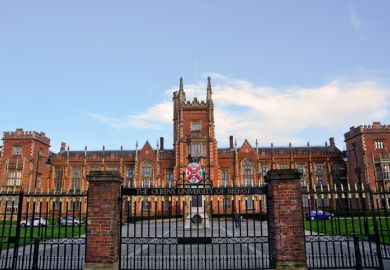The number of students accepted into higher education institutions this year is down compared with last year, but it is still the second highest number ever recorded, we reported earlier today.
This A-level results day, universities have seen a 2 per cent drop in the number of students accepted compared with the same day last year, with Ucas saying that the fall was caused by a lack of European Union and mature students being accepted onto courses.
Key figures from the world of higher education have been responding to the results.
Alistair Jarvis, chief executive of Universities UK
“There is still a great demand for university places and the proportions of 18-year-olds in the UK applying for university are at their highest ever levels. Last year’s application numbers reached a record high. There are a variety of reasons for the drop in applications this year, including the decline in the number of 18- and 19-year-olds, changes to funding for degrees in nursing, and the possible impact of the vote to leave the EU. There will still be more applications than there are university places.
“University admissions staff will be working hard to ensure that applicants know whether they have been accepted by their firm or insurance offer by 8am on A-level results day. As ever, the majority of applicants will get the grades required in their offer and will secure their place at university. Those who do not get the results they had hoped for, or those who did not get any offers, will have the option of using the clearing system. Last year, nearly 65,000 applicants used clearing to find the right course for them.
“The adjustment process also allows applicants who have achieved better results than expected to find a place on another course, while still holding on to their confirmed place for a limited period.”
Student advice: going through adjustment
Rosamund McNeil, head of education and equalities, National Union of Teachers
“This cohort was the first to face the new linear A levels and as such, the challenges that followed, too. The upheaval of a hastily reformed curriculum and the changes leading to a reduction in much of the coursework elements, created unnecessary stress and concern for pupils and teachers alike.
"The gradual decline in entries to creative and expressive subjects, linked to an increase in entries to the more traditional academic subjects, is continuing. This trend is reinforced by the curriculum-narrowing English baccalaureate (EBacc) requirements at GCSE and is leading to job losses among teachers of these ‘disappearing’ subjects.”
Professor John Latham, chair of the University Alliance
“Congratulations to everyone receiving their exam results today, which reflect the hard work and dedication of young people and their teachers. We wish them every success as they take their next steps. For many, today’s news will mean the opportunity to progress to higher education and students today face more choice than ever before. Alliance universities are proud to offer world-class technical and professional education – our close links to industry mean that we can design innovative courses closely aligned to the future needs of the economy: more than 40 per cent of degrees at Alliance institutions are accredited by professional bodies.”
Pippa Morgan, CBI head of education and skills policy
“Congratulations to everyone getting results – a lot of hard work and determination has paid off for people’s futures. There is a whole range of fantastic opportunities available from college or university courses, to high-quality apprenticeships that help build skills and careers. That’s why it’s so important that young people get good advice about the whole world of options available. As valuable as exam results are, they are one of several factors that employers look for when hiring. Businesses value young people with positive attitudes to work and their career – as those people so often succeed in any field that they pursue.”
“Universities can offer students a great route to expand their learning and prepare for their next step. It’s one of a wealth of options available, with apprenticeships and other ‘earn while you learn’ schemes also offering routes to gaining skills and starting a great career. To grow the quality and uptake of apprenticeships, it’s important that the government continues to work with business on how the apprenticeship levy can best work – for companies and learners of any age. Increased flexibility is vital so businesses can fund a wider range of training that better reflects employer and individual’s skills needs.”
Sarah Main, director of the Campaign for Science and Engineering
“Congratulations to all students, their teachers and parents, who have worked so hard to achieve their A-level results today. The jobs of this generation will increasingly benefit from skills learned through science and maths subjects: analysis, critical thinking and combining creativity with tech know-how. The UK needs talented young people with science and tech skills to grow our well-being and prosperity. In recognition of this, the government has put science and engineering at the heart of its industrial strategy.
“But we still have a lot to do to encourage young people from all walks of life to benefit from the opportunities that developing maths, science and engineering skills offers. As a first step to achieving this, the government must urgently address the shortage of teachers in specialist subjects such as maths, computing, engineering and physics.”
Live blog for students: A-level results day survival pack
Jonathan Dando, associate director of Teach First
“Hundreds of thousands of students will today find out the results of their hard work and the incredible support from teachers and parents across the country. More young people than ever before are choosing to go to university, but our research shows that it’s likely that just one in five of those born into a poorer community will progress to university – compared with one in two in wealthier areas.
“In a post-Brexit world, this isn’t simply a matter of fairness – it’s an economic imperative that all our young people are equipped with the skills to succeed. We must do more to support young people to reach their full potential. This means expert careers advice in every school, attracting teachers to work in the communities that need them the most; and better targeted university outreach programmes.”
Tim Bradshaw, acting director at the Russell Group
“Congratulations to all those who have achieved the grades that they wanted. Some Russell Group universities have places to offer through clearing to students who have exceeded expectations, and some have places for highly qualified students who have narrowly missed out on their first choice.”
Alan Palmer, head of policy and research for MillionPlus
“Today is an important day for everyone receiving their results and making decisions about the next stage of their life. Overall applications are down 2 per cent, and the broader picture for English domiciled students should give us cause for concern.
“There continues to be big decreases in the number of older students from England – down 10 per cent on last year for those aged 25 or older. This has had a particular impact in nursing, which draws the majority of its applicants from this age group. The impact of the government’s decision to remove bursaries appears to be a decline in the number of students applying to study nursing. It is also worth noting the decline in the number of EU students – down 3 per cent on last year. This is a trend that may well continue as the realities of Brexit become clear.
“The UK is a global leader in the provision of higher education and is worth more than £10 billion to the UK economy, and it is in the national interest to ensure that these trends are reversed. Higher education is a transformative experience and we need to ensure that students from all backgrounds are not dissuaded from applying to university. It remains the case that studying at university is one of the best decisions an individual can take to be successful.”
Nick Gibb, school standards minister
“Congratulations to everyone receiving their results today, which are the culmination of two years of dedication and hard work. We want everyone, regardless of [their] background, to be able to fulfil their potential and, for many, A levels are the pathway to a university degree.
There has been a strong uptake in core subjects, such as maths, which continues to be the most popular A level, with maths and further maths having nearly 25 per cent more entries than in 2010. This, and increasing entries to science, technology, engineering and maths (STEM) subjects bodes well for the economic prosperity of our country. It will help to grow our workforce in these sectors, allowing young people to secure well-paid jobs and compete in the global jobs market of post-Brexit Britain.
“Increasing the number of girls studying STEM subjects has been an important objective of the government, so it is particularly pleasing to see that more young women are taking STEM subjects, and that for the first time since 2004 there are more young women than young men studying chemistry. I hope that everyone receiving their results will go on to successful careers.”
Professor Les Ebdon, director of fair access to higher education at the Office for Fair Access
“Congratulations to everyone receiving their exam results today. I am delighted that there has, once again, been a rise in the number of young people from the most disadvantaged backgrounds getting the grades that they need to secure places in higher education.
“These students have overcome barriers that many others do not face, and I applaud their effort and dedication. They will find that higher education is a rewarding and life-changing experience, as it was for me. Unfortunately, some young people have picked up exam results today that do not reflect their full potential, because they have been held back by socio-economic or educational disadvantage. All children deserve to get the support that they need to overcome any and all barriers of circumstance, so that each can achieve to the level that they deserve. Universities and colleges have a key role to play in working with schools to provide support.”
Charles Tracy, head of education, Institute of Physics
“Studying physics at A level is uniquely rewarding and imparts a whole load of skills that are useful in all walks of life – developing critical thinking, modelling, problem-solving, and so on.
“We’re very pleased to see young people choosing physics in increasing numbers, and that they are succeeding at it – with a higher proportion achieving the top grades. These qualifications will prove to be an excellent foundation for students’ next steps, setting them up for life. It is disappointing, though, that the number of girls taking physics remains low, and we will continue to work hard at improving the gender balance in our subject.
The increase in physics entries comes at a time of change for A levels, with many subjects being reformed, with content changes aimed at better meeting the needs of higher education. There is now less coursework in England and Wales, and more practical sessions for the sciences in England.”
Register to continue
Why register?
- Registration is free and only takes a moment
- Once registered, you can read 3 articles a month
- Sign up for our newsletter
Subscribe
Or subscribe for unlimited access to:
- Unlimited access to news, views, insights & reviews
- Digital editions
- Digital access to THE’s university and college rankings analysis
Already registered or a current subscriber?






